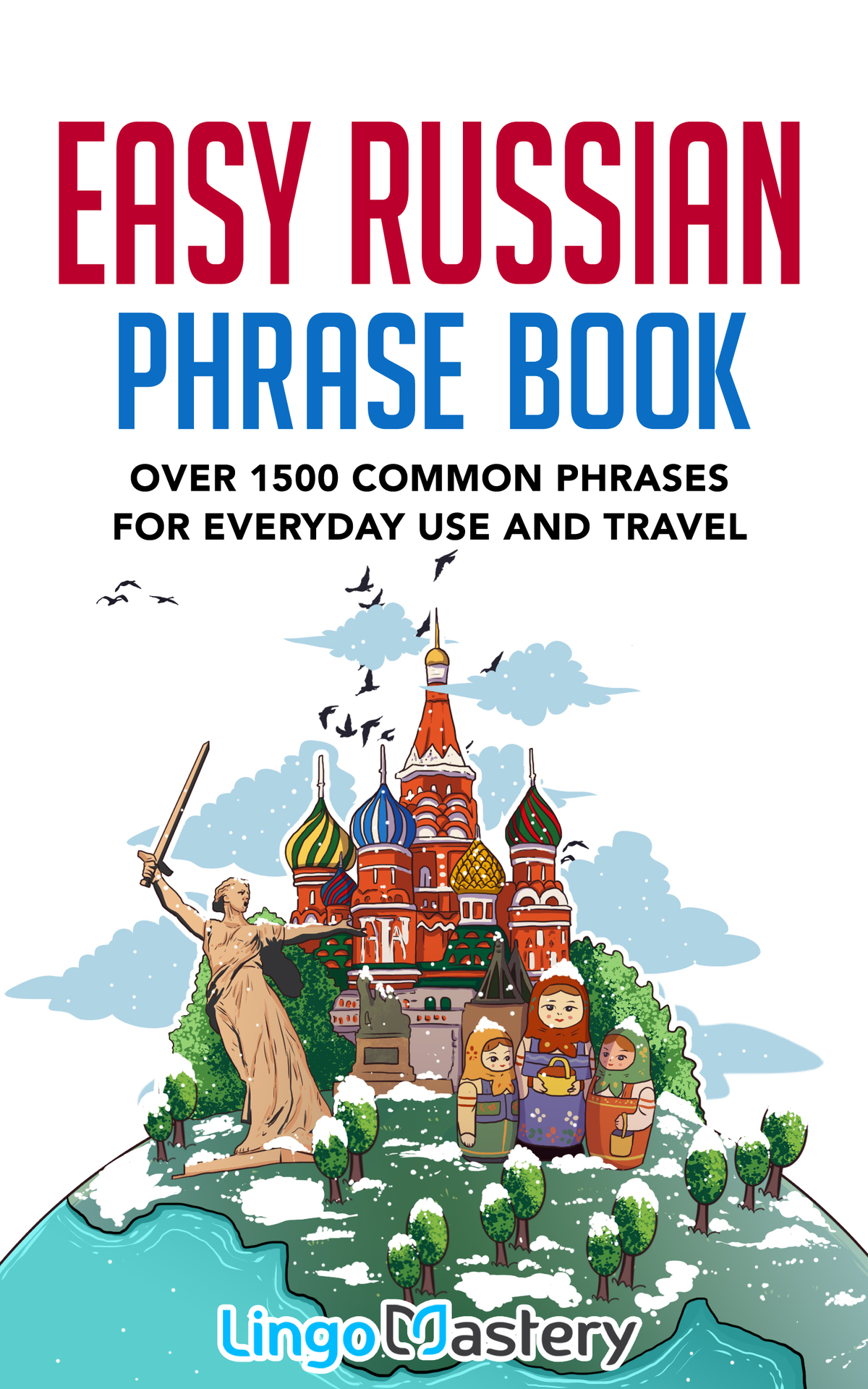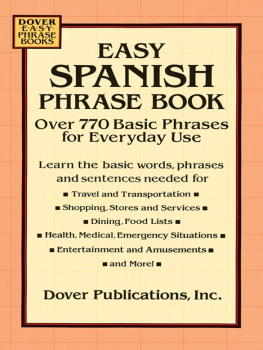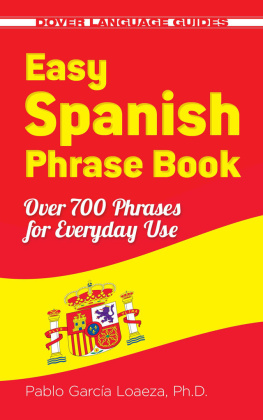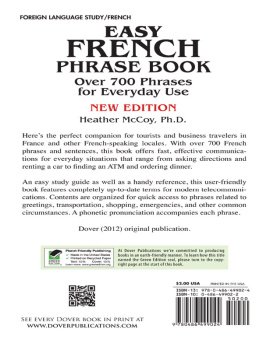Easy Russian Phrase Book
Over 1500 Common Phrases for Everyday Use and Travel
www.LingoMastery.com
Copyright 2020 by Lingo Mastery
ALL RIGHTS RESERVED
No part of this book may be reproduced, stored in a retrieval system, or transmitted in any form or by any means, electronic, mechanical, photocopying, recording, scanning, or otherwise, without the prior written permission of the publisher.
Free Book Reveals the 6-Step Blueprint That Took Students from Language Learners to Fluent in 3 Months
- 6 Unbelievable Hacks that will accelerate your learning curve
- Mind Training: why memorizing vocabulary is easy
- One Hack to Rule Them All: This secret nugget will blow you away...
Head over to LingoMastery.com/hacks and claim your free book now!
Contents
Numbers
MORE FROM LINGO MASTERY
Introduction
If you have finally decided to visit Russia, one of the richest countries in history and culture, then you should naturally be thinking about the words, phrases, and essential things that a variety of everyday situations call for. This is all the more important since, unfortunately, the average level of English comprehension in Russia is not that good when compared to other European countries.
Thanks to this book, we will learn how to address many situations that can be simple, complicated, funny, or not so funny at all all those real circumstances that a tourist would experience when, for example, looking for activities , ordering dishes with national cuisine at a restaurant, or simply dont want to be bothered.
Think of the souvenirs you would bring back for a relative: do you want to negotiate your price or ask for a discount? In that case, it is certain that you will need to express yourself correctly.
Most of the time, having the vocabulary at your fingertips is the best solution, so why not take precautions and study a few phrases that could amaze your fellow travelers or your future conversation partners?
Of course, there are some obstacles to overcome, and the greatest one is pronunciation. Lets see what letters there are in the Russian language and what sounds they produce. The Cyrillic alphabet, which is the alphabet the Russian language uses, may look intimidating at first, but we promise it isnt nearly as intimidating as it seems to you right now.
Also please note that we capitalize stressed syllables for your convenience. For example, (mom) [MA-ma]. If there are no capitalized syllables, then it means that there is only one syllable in the word.
Each sentence is followed by a detailed transcription. At first you may be slow at decoding it, but dont get discouraged if it sounds difficult or you stumble over certain letters. It is all part of the process, and if you are patient and attentive, you will be faster and faster with every next word.
Pronunciation of Russian vowels
There are ten letters in the Russian language that are used to indicate vowels: , , , , , , , , , .
Lets see how they are pronounced and how they will be transcribed in transcription in this book. The first five, the hard vowels, are quite simple.
A [a], pronounced as a pure ah, or the sound you make when your doctor tells you to stick your tongue out (or the a in father) [a ] . In unstressed syllables it can be pronounced as a neutral vowel, just like the first and third syllables in the word banana [].
O [o], pronounced like o in toe. In unstressed syllables it can be pronounced either as the previous [a] sound or as a neutral vowel [].
[u], pronounced like oo in moon but not so much prolonged. Sometimes can be pronounced as a neutral vowel [].
[eh] , like the e in bed.
There is one more hard vowel that we dont have in English: [y]. This sound is usually difficult for Russian learners to understand and pronounce. To get an idea of how to do it, try to hold the long [i:] vowel sound in the word be. Feel the sides of your tongue touching the insides of your top molars? Keep the sides of your tongue exactly where they are and slowly drop the center of your tongue. If it sounds and feels goofy, dont worry it should. Tried it?
So, this is how Russian is pronounced. Or, there is also another way. When you pronounce the long [i:] sound, the root of your tongue goes down, while the tip of the tongue goes to your lower teeth. With the Russian [y] sound you should do everything the other way around the root of the tongue goes up, while the tip of the tongue doesnt touch the teeth at all.
For example, (we) [my].
Next, lets move on to the soft vowels. For now, just think of soft vowels as hard vowels with a [j] in front of them. The sound [j] corresponds to the English y in yes.
In fact, the sound [j] is always considered to be a separate syllable in Russian phonetics, but to make it easier for you to unite sounds into words, weve decided to mark the combinations of [j] and vowels as one syllable .
[j+a], pronounced like the ya in yall.
For example, (next to) [RA-dm] and (yacht) [JA-h-t]
[j+o], pronounced like the word yo.
For example, (ice) [lod] and (hedgehog) [josh]
[j+u], pronounced like the word you.
For example, (people) [LU-di] and (south) [juk]
[j+eh], pronounced like the ye in yellow.
For example, (summer) [LEH-t] and (fir tree) [jehl]
[i], pronounced like ee in knee but not so prolonged.
Thats all the vowels! Russian pronunciation has some specifics that we will mention here, although dont worry too much about them. If you practice using the pronunciation that we are providing you with, you will certainly be understood by Russian speakers!
That said, the letters (, , , ) can be pronounced in different ways depending on what other letters surround them.
These vowels can produce two sounds if they are located:
- At the beginning of the sentence
- After a vowel
- After (the soft sign) or (the hard sign). These letters are read but not pronounced. They only point out the softness or hardness of the preceding letter.
In all the other places they have one sound.
*****
The following vowels make the preceding hard consonant soft , , , , .
For example, (forest) [lehs]
For Russian native speakers it is natural to observe this softness even if they dont know this phonetics rule. But since you are not a native speaker, weve marked all the soft consonants for you so that you dont have to focus on remembering the rule and applying it.
Again, dont worry too much about this at the start. We are telling you how to pronounce everything correctly anyway!
Ready to go over to consonants? They are simple, we promise ! Lets start with letters that look exactly the same.
K [k]
Pronounced like c in cat; unlike in English the sound is never aspirated.
M [m]
Pronounced like m in milk.
[t]
Pronounced like t in tiger , but with your tongue on your teeth and not on your palate (like we say in English).
Now lets take a look at the letters that will be totally new to you (even if the sounds themselves wont be)!










